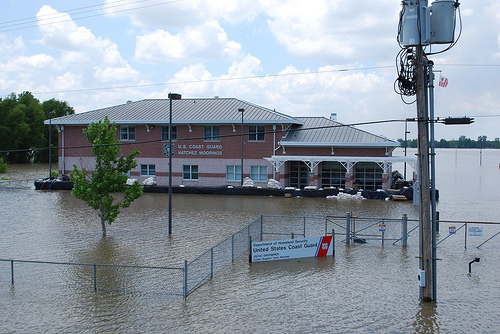Coast Guard Closes Parts Of Mississippi River To Barges

The biggest impact may be felt in the Midwest, where exporters rely on the Mississippi River to move grain and livestock south. However, Coast Guard officials said the river needed to be closed so barges would not put further pressure on levees. The closure was not given a specified length of time.
Meanwhile, workers are still working up and down the river to contain floodwaters which have already been predicted to cause billions of dollars of damage.
The Washington Post reported:
All along the Mississippi, a small army of engineers, deputies and even inmates is keeping round-the-clock watch at the many floodwalls and earthen levees holding the water back. They are looking for any droplets that seep through the barriers and any cracks that threaten to turn small leaks into big problems. The work is hot and sometimes tedious, but without it, the flooding could get much worse.
Although the job requires 24-hour vigilance, Reynold Minsky, president of a north Louisiana levee district, said there are some places in his mostly rural district of forest and farmland where he will not ask anyone to go after sundown.
“Unless we’ve got a serious situation that we know we’ve found before dark, we don’t ask these people to go into these wooded areas because of the snakes and the alligators,” Minsky said while taking a break from helicopter tours of the levees. “That’s inhumane.”
Minsky’s 5th Louisiana Levee District is plagued these days by “sand boils,” places where river water has found a way through earthen levees and bubbled up on the dry side like an artesian well. He insists they are no reason for alarm. If the water is clear, as it has been so far, that means the levee is not eroding. Stopping the boil involves ringing it with sandbags.
The latest region to be affected by the swelling river is the Lousiana bayou, at the mouth of the Mississippi. The area is prone to hurricanes and flooding, and now parts of towns may be underwater again due to the opening of a spillway to relieve the flow down the Mississippi.
Now residents of the Louisiana countryside are preparing for the worst, again.
From Reuters:
While levees along the Atchafalaya River are expected to hold, water in tributaries and bayous like the waterway behind the Stephensville school can't flow into the larger swollen river, causing "backwater" flooding.
But rather than give up, school staff, disaster response crews and the National Guard spent the last two weeks building a dirt levee behind the school.
Rawls, sweaty and red-faced, said he expects the school to flood, but hopes to mitigate the damage.
"We have no guarantees, just prepare the hardest you can and the best you can," he said. "We were identified as one of the first sites to go under. At least we had two weeks -- people hit by tornadoes might not even have a few minutes."
Plenty in the flood's path packed up and headed out. About 3,500 people have evacuated so far, Gov. Bobby Jindal said.
Though parts of Lousiana are still under a flood warning, including the state's capital, Baton Rouge, the river is now expected to crest Wednesday, according to the National Weather Service.
Reach Executive Producer David McAlpine by e-mail, or follow him on Twitter (@DavidMcAlpine)



